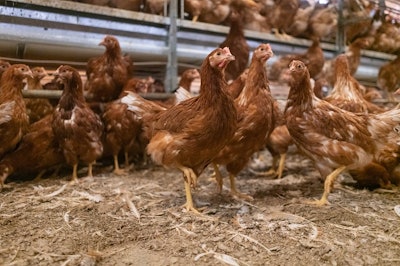
Identifying people as “key owners” for specific biosecurity tasks would help egg producers improve their biosecurity programs and prevent highly pathogenic avian influenza (HPAI) from infecting their flocks.
In a new resource created by agricultural cooperative United Egg Producers’ (UEP) HPAI task force team, the organization says that each portion of an egg producer’s staff should be assigned specific tasks to help prevent a biosecurity breach on egg farms.
This article specifically covers the roles that an egg producer’s gate personnel, grounds team/maintenance, sanitation group and all employees play, according to UEP’s HPAI task force team.
Gate personnel
Because gate personnel normally work just outside the primary business of activity (PBA) and line of separation (LOS), they should require anyone entering the premises to provide proof that their vehicles have been cleaned and disinfected before entering. Additionally, gate personnel should have the authority to turn away those who do not meet this requirement.
Grounds team/Maintenance
The facility’s grounds and maintenance teams should:
- Clearly define the LOS and ensure its signage is visible.
- Perform a daily, external LOS disinfection using eco-friendly products around the entrances, air inlets, fans and flat surfaces, particularly during times when equipment or birds are being moved.
Sanitation team
An egg producer’s sanitation team should be responsible for:
- Confirming disinfectants are being mixed at the correct concentrations.
- Ensuring mats are cleaned and disinfected daily, or when dirty at a minimum. Fresh solution should be added to the mats at least every 24 hours. While the cleaning solution can be stored in a container next to the mat, a new solution should be mixed at least every 72 hours. Alcohol based solutions are not sufficient for cleaning footwear. If the mat solution is causing the floor to be slippery, add an epoxy treatment to the floor for added traction.
All employees
All employees should be responsible for managing the birds and addressing pest activity.
Concerning wild bird management, employees should:
- Utilize lasers to keep wild birds away from the farm.
- Obtain a nuisance permit from the state’s Department of Environment Conservation for hunting waterfowl to prevent them from entering the facility. If there is a pond on the farm, place stringers across the pond in a grid formation to detract waterfowl from landing.
- Inspect for and remove bird nests being built around the facility daily, especially during Spring.
Concerning general biosecurity on the farm, employees should:
- Inspect, manage, supply and clean the showers.
- Verify coworkers are properly showering in and out to wash off potential bacteria. A Danish entry system is recommended and the LOS should not be crossed until leaving the facility. If employees need to go outside, they must shower-out, then shower-in when reentering.
- Wash their hands throughout the day.
- Use separate sets of clothing and shoes for different areas on the farm.
- Have designated, approved procedures to reduce cross-traffic with employees in separate areas on the farm.
Learn more about the roles an egg producer’s management team should play in biosecurity.


















